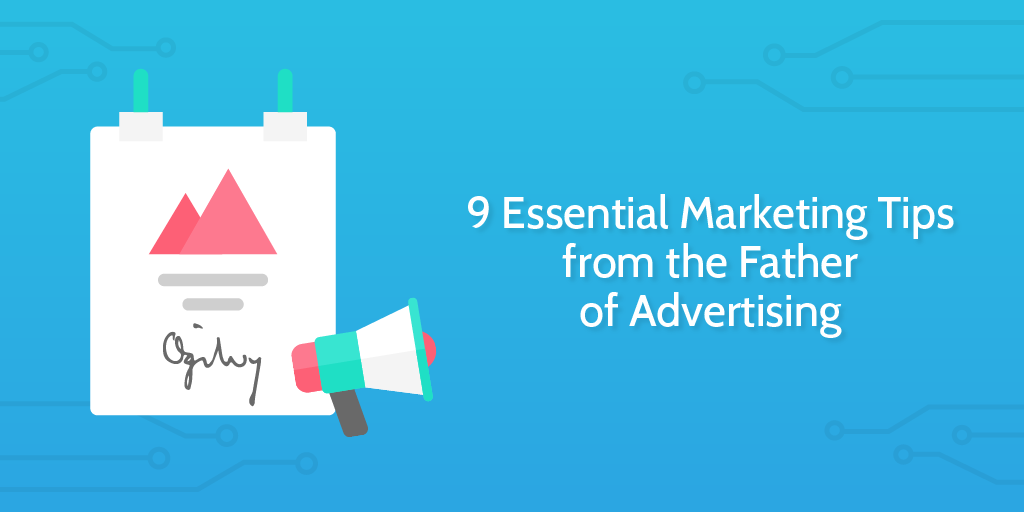
Ogilvy on Advertising was one of the first books I had on my reading list back when I created my system for reading more. My only regret after finally reading it is having delayed for a year and a half.
Drawing from 40 years of experience, David Ogilvy shows everything he learned from creating some of the most successful advertising campaigns to date (some of which are still running today).
From using research instead of rules to reminding yourself exactly what you’re paid to do, Ogilvy provides a blunt outlook of how to improve as a marketer and copywriter.
“When I got a margarine account, I was under the impression that margarine was made from coal. Ten days reading the literature taught me otherwise.” – David Ogilvy, Ogilvy on Advertising, p.11
At times his writing is standoffish and hostile, and he never claims to be infallible, but many of the marketing tips he championed 24 years ago still hold true today. Unfortunately, finding those nine golden tips in 220+ pages of case studies and niche information on how advertising agencies work is a bit of a nightmare.
That’s why I’ve done it for you. Time is money, after all, and the quicker you learn these marketing tips, the sooner you can succeed in selling.
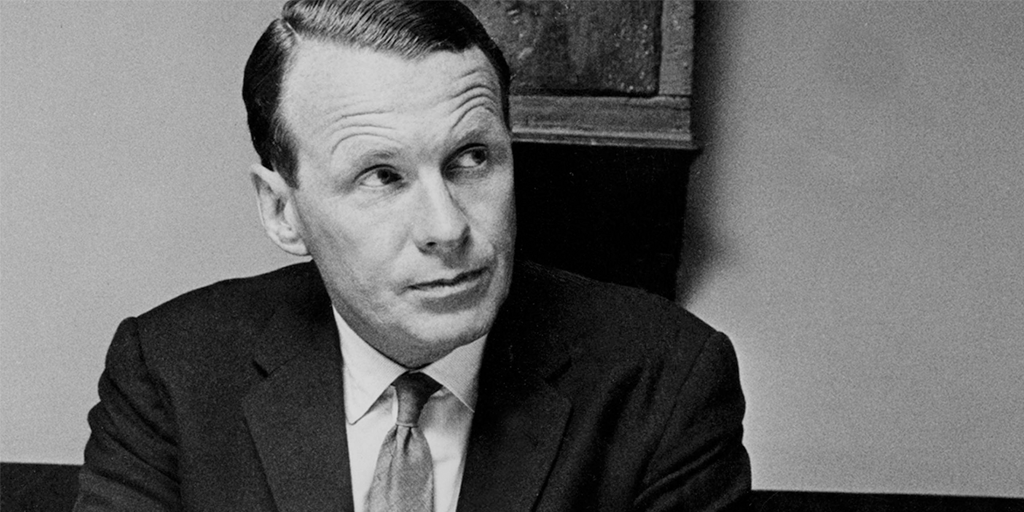
Use research, not rules
If there’s one thing to take away from Ogilvy on Advertising, it’s that the man was obsessed with the power of research. From which fonts perform best, to color selection, layout, positioning, and even character count, Ogilvy had masses of research to draw from to inform his decisions when creating a new ad.
Having said that, within the first two pages of his introduction Ogilvy denies enforcing “rules”.
“I hate rules. All I do is report how customers react to different stimuli” – David Ogilvy, Ogilvy on Advertising, p.8
In other words, Ogilvy would base most of his decisions on what had worked in the past, and on principles that research had shown to be true. He wouldn’t stick to them religiously, but by researching and learning common factors about his audience he was able to get a level of consistency in his results.

For example, several times in Ogilvy on Advertising he seems to be baffled at the decision of others to use white text on a black background, because research has repeatedly shown that it is much harder to read.
Organize your research
Research is useless if you can’t retrieve it at a later date. In fact, this is one of Ogilvy’s main criticisms of researchers in advertising agencies:
“Even if somebody remembers that the research was done, nobody can find it. So we re-invent the wheel, year after year.” – David Ogilvy, Ogilvy on Advertising, p.36
If you can’t reliably retrieve the information you gather you’re forcing yourself to redo all of the work just to discover the same thing over and over again. In today’s climate, however, you can take this one step further – you don’t even have to do most research yourself.
Sites like ProBlogger exist with the sole purpose of helping you to establish your own blog and grow from the lessons they’ve learned doing the same. Brian Dean conducts fantastic research into SEO and link building strategies, then publishes his results on Backlinko. Growthhackers, Inbound, and entire subreddits exist to collect and promote the best content from around the web on anything from copywriting and marketing to truly awful one liners.
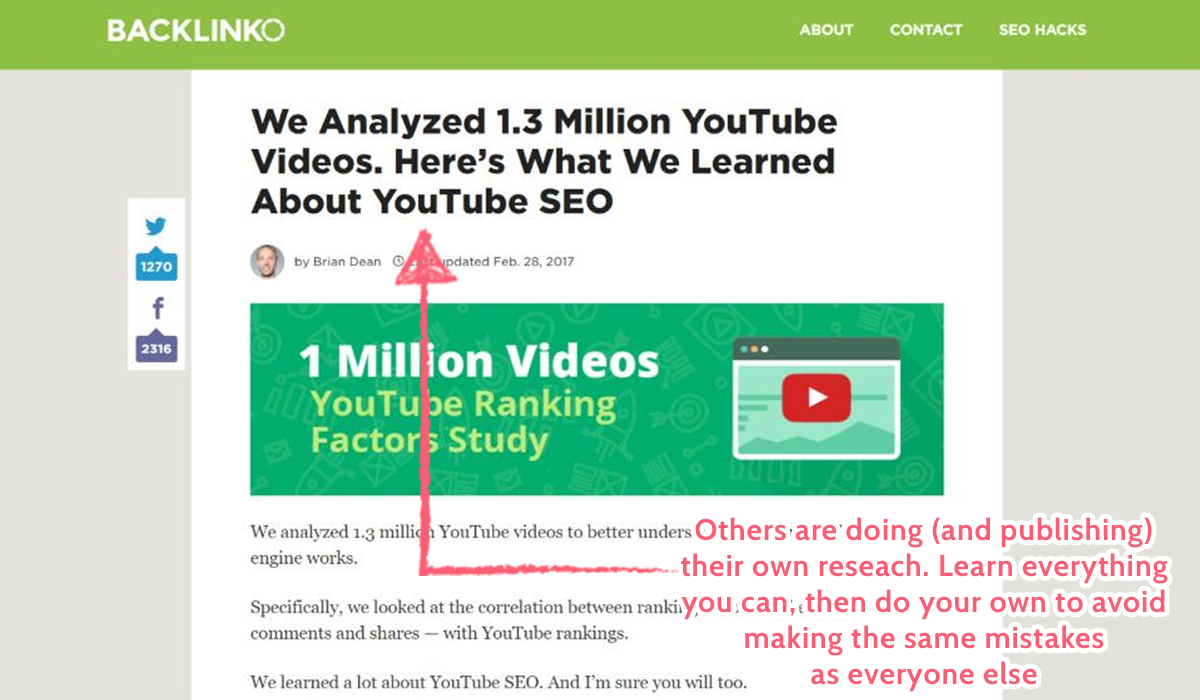
Before you undertake an entire research project, search the web for existing studies. People with more resources than you have probably already published a post answering your question in full.
Note: I’m not saying that you should entirely rely on the research of others, just that it’s insanity to not learn from what’s already out there.
You’re not paid to be “creative” or “original”
It’s nice to say that we’re “creatives”. It feels good to imagine pushing the limits of our respective fields with original ideas and by breaking new ground. You don’t want to be just another copywriter, doing the same thing as everyone else – you want to stand out.
But you’re not paid to be creative – you’re paid to fulfill a purpose.
Whether you’re introducing a product, pushing an affiliate link, or guest posting with the aim to score backlinks, you’re never being paid to just be creative. Creativity might help you reach your results, but the trait alone will do nothing if you don’t channel it.
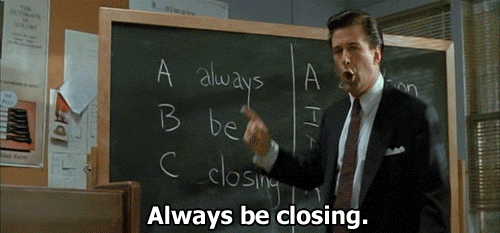
Ogilvy makes this point by highlighting previous winners of the Clio awards (given to creative and innovative examples of advertising, design, and communication). Almost half of them had either lost the client they produced the ad for or gone flat-out broke.
“Of 81 television classics picked up by the Clio festival in previous years, 36 of the agencies involved had either lost the account or gone out of business.” – David Ogilvy, Ogilvy on Advertising, p.25
In terms of copywriting and advertising, this means you’ll sometimes have to swallow your pride and follow a formula that’s been proven to work. Producing “original” content just isn’t enough to get a wide audience – there’s a reason you see so many list posts and videos around the web.
I’m not saying that it’s an excuse to get lazy with your quality or resort to boring topics, but instead that you need to make use of every tool available, no matter how tacky you feel it might be. If you don’t hit your targets and provide solid benefits to your employer (or clients), all the creativity in the world won’t save you.
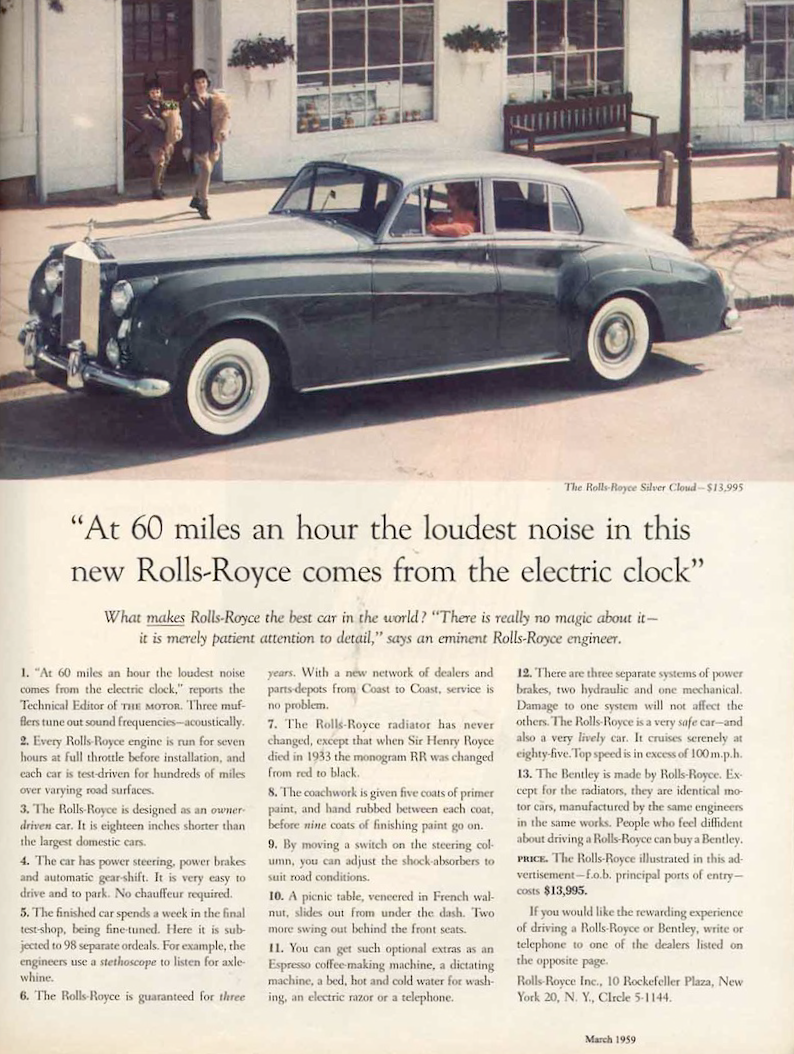
Incidentally, it’s amusing to note that Ogilvy & Mather won their first Clio award a year after Ogilvy’s death. He may have won many more if not for his distaste for the event.
You can’t force good ideas (but knowing a lot helps)
We’ve all had a time when inspiration has struck in the most unlikely circumstances. Maybe you were singing in the shower, or perhaps you were sound asleep and it came in a dream – that’s how Ogilvy thought of Pepperidge Farm’s iconic horse-drawn carriage ad. Either way, this happens because the best ideas come from your subconscious.
“Big ideas come from the unconscious… But your unconscious has to be well informed, or your idea will be irrelevant. Stuff your conscious mind with information, then unhook your rational thought process.” – David Ogilvy, Ogilvy on Advertising, p.16
Crunching when you’re trying to come up with your next big idea is pointless. Sure, you might be able to power through and write 2,000 words in an hour, but as soon as you try to get imaginative you’ll lose the plot.
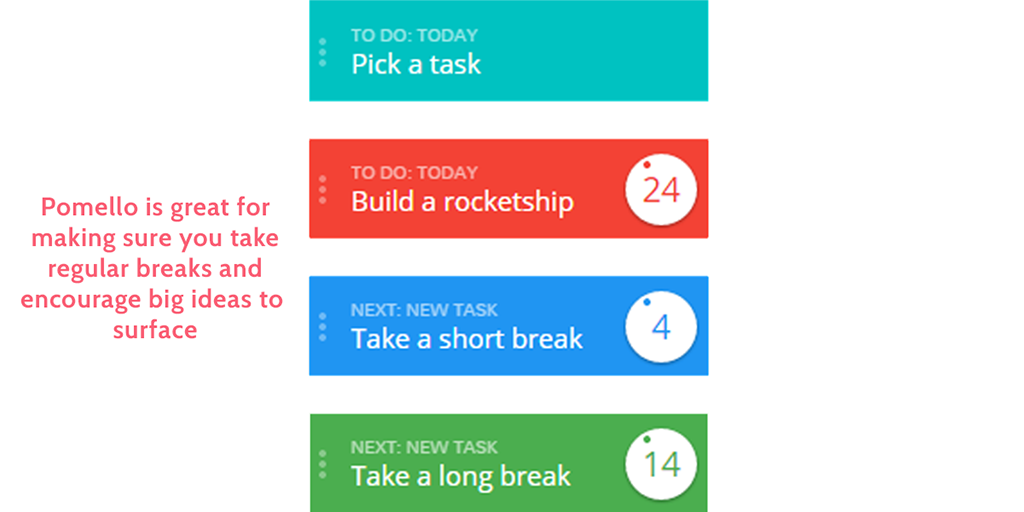
Instead, you should be reading around your topic as much as possible, then letting the information settle and your mind naturally sift through until something clicks. Stuff your head with as many blog posts, podcasts, and books as possible, then take a break and let the magic happen.
Go for a walk. Have a hot bath. Set your alarm and have a nap. Do something to give your head space to work, and conserve your energy to act when it does.
Knowledge separates the good from the great
If you’re literate, you can write. If you can write, you can type. If you can type, you can write a blog post. If you can write a blog post, you can technically produce content.
It’s not complicated to learn the basics of almost any trade on the planet, and Ogilvy knew this. After all, there’s a limit to how quickly a person can write, and how accurate their spelling and grammar can be. So, what separates a good copywriter from a great one?
Knowledge.
“There isn’t much to choose between surgeons in manual dexterity. What distinguishes the great surgeon is the he knows more than the other surgeons.” – Sir Hugh Rigby, Ogilvy on Advertising, p.21
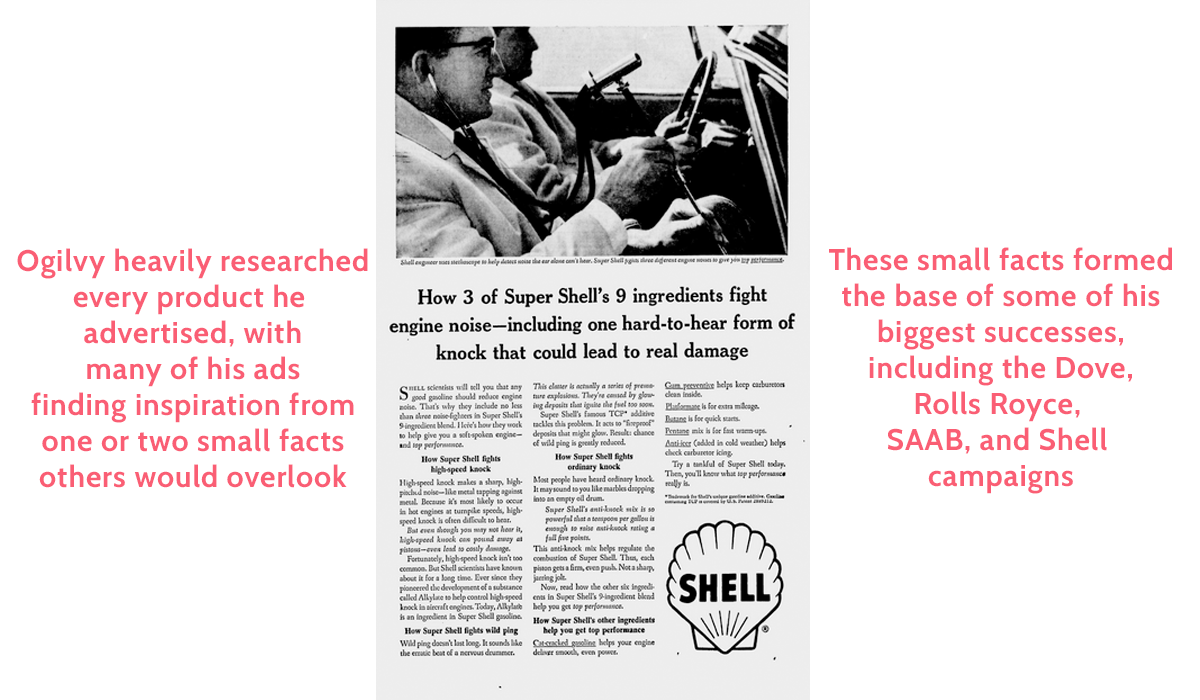
You can’t think of ideas for new content or improve your techniques if you don’t read around your topic. In the same way, you won’t make the same mistakes as everyone else if you know why they’re making them, and how to avoid them.
Short answer; to get better, read more.
“Taboo” content can sell, but only when relevant
For the sake of your business, don’t use taboo content unless it’s relevant. Sex and swearing might work for some brands, and it might catch some notice through shock value, but if it’s not appropriate you’ll only lose out.
Ogilvy knew this, again, through research. He notes that if you’re concerned with your purpose of selling more of a product, it doesn’t matter if you’re offended by something or not. What matters is if your target audience will be offended.
There are two things to consider when thinking about using tactics such as sex and swearing in advertising – the context you use it in, and its relevancy to the thing you’re advertising. For example, if you’re advertising a beauty product it may make sense to use a nude model (or a variation), as that is relevant to your product. The same can’t be said for advertising an AGA cooker.
Put it this way; Process Street might be a fantastic product, but I guarantee that we wouldn’t succeed in posing it as “sexy”.
If you’re not passionate, quit
Due to how bluntly he writes, Ogilvy can come across as being overly harsh and even antagonistic. He has no qualms about calling out the mistakes he sees in others’ advertising, and readily dismisses those who criticize him as “old-fashioned”.
So when he turns motivational speaker, it reads as a rather backhanded compliment.
“There are no dull products, only dull writers” – David Ogilvy, Ogilvy on Advertising, p.18
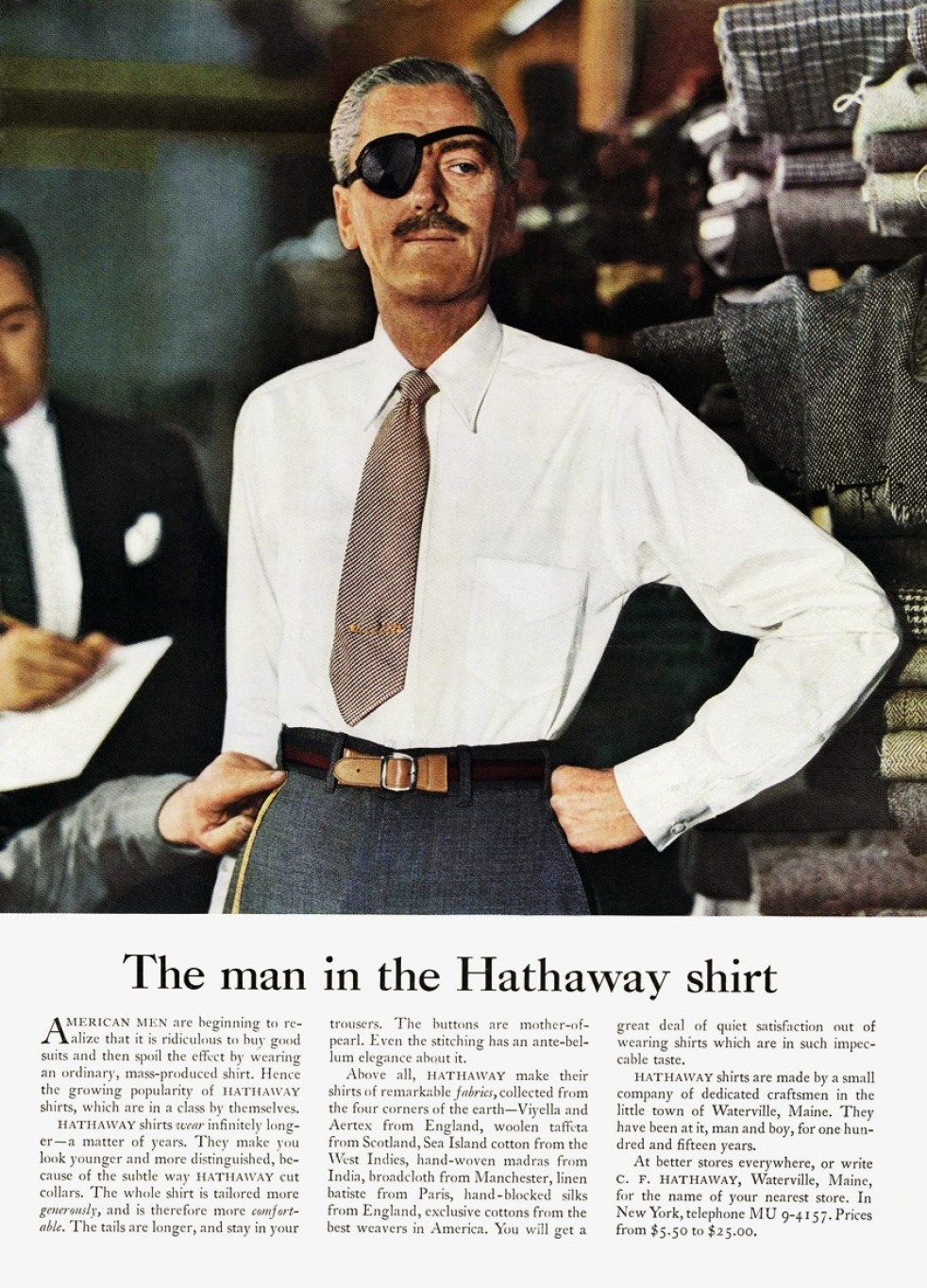
This is Ogilvy touching on the dire need to be enthusiastic about a product and profession in general. If you’re passionate about something you’ll naturally do it better, and if you’re enthusiastic while you write then your readers will get caught up in that same enthusiasm.
At Process Street, for example, we’re encouraged to mix up keyword-targeted posts with more individual “inspiration” posts. As long as they’re something related to our field, we can write on largely any topic we want for these articles, and because we’re enthusiastic about these topics they are usually completed faster and to the same (or even higher) quality as the rest of the blog.
“Be happy while you’re living, for you’re a long time dead” – an old Scottish proverb, Ogilvy on Advertising, p.40
Ogilvy also makes a rather profound point of being happy while you’re living, which for him meant telling someone when he thought they were wasting their talents in advertising. One of his partners quit on his advice, followed their passion as a naturalist, and saved a species of fauna from extinction.
In short, if you’re not passionate about what you do (or can at least find an element of passion in it), you’ll serve both yourself and others better by quitting and doing what truly interests you.
Don’t use pretentious jargon
Complicated jargon is a surefire way to lose your audience. Nobody cares how many dictionaries you’ve eaten or thesauruses you’ve memorized – if all you do is vomit complex words, you’ll both bore and alienate the people you’re trying to engage.
You’re not being paid to show off your vocabulary. You’re being paid to engage an audience. An audience which doesn’t know (or care) what “effervescent” means, so if you’re actually trying to build a blog or a credible campaign, just say “fizzy” instead.
“Worst of all, researchers use pretentious jargon… Come off it, professor.” – David Ogilvy, Ogilvy on Advertising, p.37
This is Ogilvy – a highly educated man who based many of his ads on facts, figures, and hard research. If he believes that “judgementally” is pretentious jargon, you’re safe in betting that your average reader will think the same.
Write in a way that your target audience can understand you, otherwise you will lose them. After all, when they read your copy they’re not in a crowd. You have to connect to and win over each audience member individually.
Don’t fix what isn’t broken
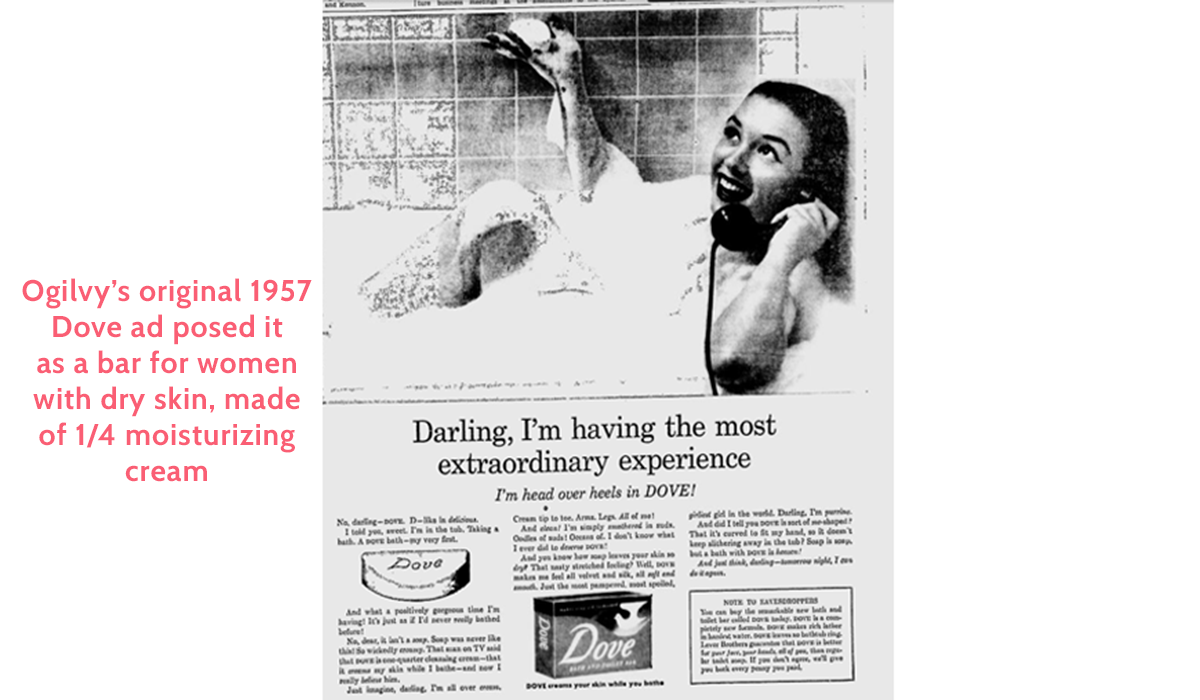
As Ben Brandall pointed out in his branding case study, a number of Ogilvy’s most successful ads ran for decades. His campaign for Hathaway shirts saw their business explode after more than a century of small-time success. His theme for SAAB as ideal winter cars not only won them an award three years after first appearing, but was iterated on for 49 years, stopping only when the company itself fell through.
“You aren’t advertising to a standing army; you are advertising to a moving parade.” – David Ogilvy, Ogilvy on Advertising, p.20
Ogilvy’s original Dove ad in 1957 made a point of highlighting that Dove was 1/4 moisturizing cream, and so wasn’t even technically soap. With minor alterations, his exact copy is visible on the company’s website to this day, 60 years later.
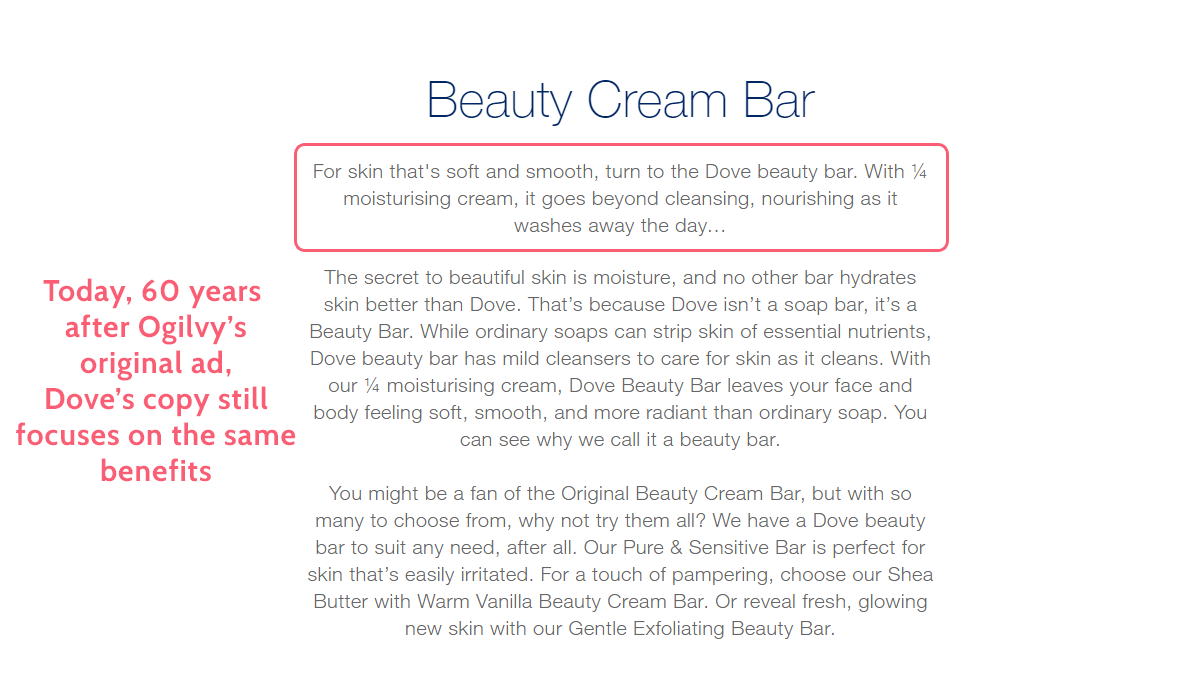
Obviously, this isn’t directly applicable to all marketing. Startups, for example, have products which will drastically change in a short space of time, and so repeating the same ads and/or marketing techniques may hurt business more than help it.
However, if you create a successful marketing campaign, you should stick to it for as long as it continues to work and remain relevant.
If a particular ad, layout, or tone resonates with your target audience enough to shift them towards your product you’re only wasting potential if you change tactics too early. Not only that, but the longer you stick to (or iterate on) a formula or image, the more familiar your brand will become – a brand which is forever changing its position will be far more easily forgotten than one which stays consistent.
Remember – these marketing tips aren’t gospel
Ogilvy never intended for his teachings to become some kind of rule book which must be followed at all times. Especially when considering the time that’s passed and technology we now have access to, applying everything he says to your own business would probably end in disaster.
Instead, take the nine marketing tips I’ve highlighted here and apply them to your own copywriting and advertising. Research other posts, books, and sources to compare their advice and see what works best.
After all, Ogilvy may have created some of the most successful advertising campaigns in history, but if not for research, he’d still think that margarine was made from coal.
What do you think of Ogilvy’s copywriting and marketing tips? Have any recommended reading of your own? I’d love to chat in the comments.







Ben Mulholland
Ben Mulholland is an Editor at Process Street, and winds down with a casual article or two on Mulholland Writing. Find him on Twitter here.